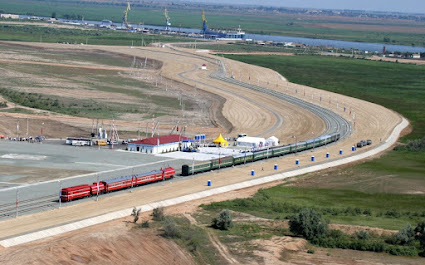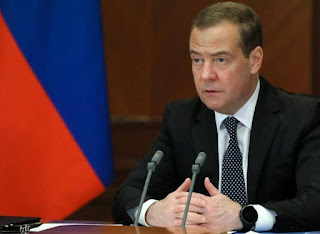
The Decisive Decade Of The American Century
Before becoming the center of gravity of the modern civilization along with its broad Western coalition, Europe’s history became different from the rest of the world in that it was home to the deadliest armed conflicts in recorded history. The speed and rate of killing was matched only by the speed of American ascent to power and the rate of exploitation of human and natural resources. The weapons of mass destruction some Western states still store and their ability to unleash mercilessly crushing blows should make every reasonable person skeptical of the virtues of the civilization of superlatives.
Between the so-called world wars one and two, European countries killed between 40 to 60 million people of their own. During the first five years of the 1940’s alone, another 60 million European civilians were uprooted from their homes—27 million of them had left their own countries or had been driven out by force. Out of all this carnage, emerged the leading powers of the world with the United States representing and leading the so-called “free world”. In post-war world order, the Western bloc wielded two unmatchable weapons that ensured the subordination of the rest of the world: (1) The largest military force armed with the most destructive weapons humanity ever invented—nuclear weapons; and (2) a tightly controlled financial system tethered to the US dollar. The Western bloc used both the brute force of the military, including invasions, missile strikes from afar, and covert and overt coups to removed undesired regimes; and the soft power of sanctions that chokes the economies of unfriendly nation states. The deployment of these cruel weapons took place outside Europe and allied nation states. In this context, Europe did not suffer another war since the end of the second war and all Western states enjoyed the accumulation and concentration of wealth—making them home to about 80% of the global wealth. That streak of peace and prosperity came to an end when Russia launched its military operation in Ukraine.As grave as the consequences of the European wars of the first half of the 20th century, the outbreak of a direct war between Russia and any NATO nation-state, especially one of NATO’s nuclear armed nations, will be catastrophic. Such a war in Europe, given the history of cruelty inflicted on each other by these warring factions, will be catastrophic because any one of the four declared nuclear-armed nations will not hesitate to use the weapons against the other, which will have repercussions not only in Europe but around the world.
Let’ s be specific despite the risks that come with predicting the outcome of an insanely fluid and ongoing event in which so many powerful actors are involved and are working to control its outcomes. These predictions are not privileged by any inside information that people in power or people connected to people in power possess. These predictions are based on an understanding of active and inactive, determinant and contributory systems whose outcomes are often beyond the control of anyone side. First, we will start with the facts and then list the systems that will determine the outcome of this conflict.
Fact 1: If Russia did not have nuclear weapons, the Western world would have invaded it before it invaded Ukraine. Moreover, the fact that Western nations are supplying weapons without involving themselves directly into the conflict makes it clear that they are aware of the consequences of an armed confrontation with a nuclear power. Russia, too, wanted to establish that balance of power when it put its strategic arsenal on alert and clearly defined the set of circumstances under which it would use the nuclear option: Being attacked at home or being attacked in Ukraine by another nuclear power or using arms supplied by another nuclear power. This is good news: It established red lines that cannot or should not be crossed without triggering a catastrophic consequence.
Fact 2: The West has used its most powerful non-military tools to push Russia out of Ukraine: Sanctions. The sanctions were so swift and broad that they surpassed all sanction regimes ever imposed on a non-compliant nation-state including Cuba and Iran. Combined the two countries have been under sanctions for nearly a century–Cuba has been sanctioned for nearly 50 years and Iran has been under some Western sanctions for more than 40 years. Since sanctions have been used before against non-friendly nation-states, including against Russia most recently when it reclaimed Crimea, Russian leaders must have anticipated them. This is important because it helps in understanding the distance the Russian leaders are willing to go in pursuit of their objectives.
Together, from the above facts and the events explained below, it is not unrea-sonable or hard to predict that Russia will achieve its declared objectives in-cluding:
- Block Ukraine from joining NATO or any other military alliance that Russia would deem a threat to Russian national security;
- Annex large Ukrainian territories to autonomous republics that will become part of the Russian Federation; and
- Normalize the status of Crimea as permanent Russian territory.
These are the obvious and stated objectives. However, Russian leaders were well-aware that these achievements alone will not be enough because none of the political and economic ramifications of the initial incursion can be erased just by ending the armed conflict. Russian leaders know that the world will be transformed in ways similar to when it was transformed after the European wars of the early 20th century. This is evident from the systems that the Russian leaders have established over the last ten years and activated immediately after the start of the military operation. We cannot account for all systems in this limited space. However, we can provide a representative list of some of the most determinant systems that might help understand the nature of the new century and the forces that will drive its events.


































